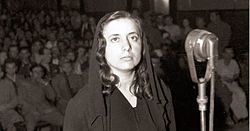Musine Kokalari
Her grandfather, Hamit Kokalari, had completed his higher studies in theology and philosophy in Turkey and was considered part of the intellectuals of the time in the Gjirokastër area, the region from which he originated.
[2] She grew up among books, music heard on the gramophone and especially fairy tales, stories and traditional Albanian songs, while she also completed a part of primary school in the city.
She achieved excellent results through writings that immediately attracted the attention of personalities of literature, linguistics, philology, ethnography, studies of the folklore of the Albanian intellectual circles with which the young Musine had the opportunity to come in contact.
[5] With her publications Musine had managed to arouse the interest of important writers such as Lasgush Poradeci, Ali Asllani and above all, Ernest Koliqi, whom at La Sapienza was the founder of the Institute of Albanian Studies.
[6] As World War II came to an end, Kokalari herself opened a bookstore and was invited to become a member of the Albanian League of Writers and Artists, created on October 7, 1945, under the chairmanship of Sejfulla Malëshova.
She had, at the age of twenty-four, indeed already published an initial 80-page collection of ten youthful prose tales in her native Gjirokastrian dialect: As my old mother tells me (Albanian: Siç me thotë nënua plakë), Tirana, 1941.
This historic collection, strongly inspired by Tosk folklore and by the day-by-day struggles of women of Gjirokastër, is thought to be the first work of literature ever written and published by a woman in Albania.
Three years later, despite the vicissitudes of World War II, Kokalari now twenty-seven, was able to publish a longer collection of short stories and sketches entitled How life swayed (Albanian: Sa u-tunt jeta), Tirana, 1944, a total of 348-pages which established her—ever so briefly—as a writer of substance.
[7] She is one of the principal subjects of the essay collection No Man's Lands: eight extraordinary women in Balkan history, by the Anglo-Kosovan writers Elizabeth Gowing and Robert Wilton.

